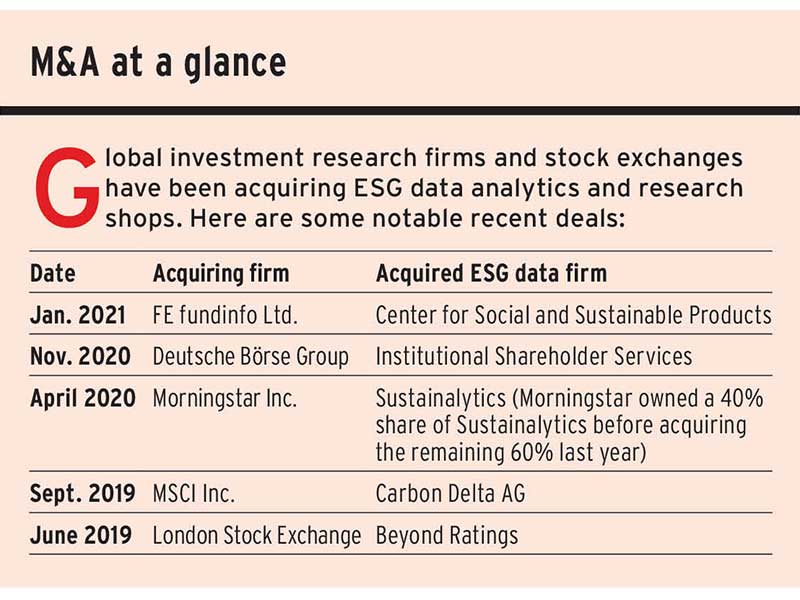
This article appears in the April 2021 issue of Investment Executive. Subscribe to the print edition, read the digital edition or read the articles online.
Canadian asset managers are targeting boutique firms with environmental, social and governance (ESG) expertise to meet growing investor demand for responsible investing products.
In December, Toronto-based Mackenzie Financial Corp. acquired Greenchip Financial Corp., a 14-year-old investment firm that focused exclusively on the environmental economy. Greenchip has been subadvisor for the Mackenzie Global Environmental Equity Fund since 2018 and manages the equities portion of an environmentally focused global balanced fund Mackenzie launched in April.
“[Greenchip] brought a certain style and value orientation to environmental investing that we didn’t have across our organization,” said Fate Saghir, head of sustainable, responsible and impact investing with Mackenzie Investments in Toronto. She added that Greenchip has a “capability and a conviction [to environmental investing] that we wanted to bring in-house.”
In 2019, Mackenzie identified sustainable investing as a “key business growth catalyst,” Saghir said. She added that the firm plans “to build sustainability in [our] culture, our corporate practices and every investment decision we make,” whether that be by acquiring other ESG specialty firms or developing in-house capabilities.
Mackenzie isn’t the only investment firm making moves in the ESG space; a number of Canadian companies have invested in ESG capabilities over the past six months.
In November 2020, Vancouver-based alternative investment manager ABT Capital Markets Inc. acquired a 25% stake in analytics and research firm ESG Data Services Inc. to bolster the services ABT provides to clients. ABT is one of several investment research firms to acquire an ESG data and analytics shop recently. (See “M&A at a glance.”)
And in August of last year, Toronto-based Brookfield Asset Management Inc. hired Mark Carney, former governor of both the Bank of England and the Bank of Canada, to serve as Brookfield’s vice-chair and head of ESG and impact fund investing. Carney, who also is a special envoy on climate action and finance to the United Nations, is helping Brookfield develop ESG funds that combine “positive social and environmental outcomes with strong risk-adjusted returns,” the firm stated.
While firms can develop their ESG capabilities through key hires or partnerships, Kendra Thompson, partner at consulting firm Deloitte Canada in Toronto, said she expects to see acquisitions in the ESG space continue.
“Acquisition is a path to [growth] acceleration and it’s also a path to culture shift,” Thompson said. “Firms are realizing that the amount of time they have to catch up to the [ESG] market leaders and to make [ESG] part of their capability set is running out.”
While many asset managers have long offered ESG products in addition to their core fund lineup, those firms only recently began to place an enterprise-wide focus on acquiring ESG talent, data and capabilities, Thompson added.
Client demand for ESG investing continues to be driven by climate change and corporate governance concerns, but social issues such as racial justice — the subject of global protest movements last year — are becoming increasingly important, said Dustyn Lanz, CEO of the Responsible Investment Association.
“Prior to 2020, the S in ESG was getting neglected, but we’re seeing a turning point now,” Lanz said. “We’re seeing a bit of a maturing market, and I think that asset managers recognize they have to grapple with all three [elements of ESG].”
Lack of well understood and universally accepted non-financial metrics to measure ESG has been a key obstacle to growth in the ESG space, said Ian Russell, president and CEO of the Investment Industry Association of Canada. But the development of ESG metrics is well underway.
The CFA Institute, for example, is expected to release a draft version of its ESG Disclosure Standards for Investment Products in May. These standards are expected to give investors greater product transparency and comparability.
In March, the European Union’s sustainable finance disclosure regulation took effect. Financial market participants in the EU now are required to provide additional disclosure for products with ESG objectives. Similar regulations are expected to be in force in Canada eventually, which is why asset managers in this country are “getting ahead of the [ESG] regulations and disclosure [requirements] that we know are coming,” Saghir said.
“Asset managers are looking to acquire sustainable finance and sustainable data capabilities,” Thompson said. “They’re doing that because they realize that just like in Europe, the Canadian market will eventually have [an ESG] standard — and when it has a standard, those firms will be held to the standard.”
